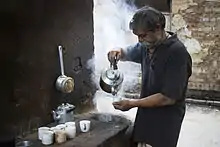Chaiwala
A Chaiwala / ChaiWalah / ChaiWallah (Hindi: चायवाला, IAST: chāyvālā) is a person who prepares, sells or serves tea on streets or small roadside shops in the Indian subcontinent.[1] They are an integral part of subcontinent culture. Chai is the Hindi and Urdu word for "tea", as in masala chai, and wallah indicates the person performing the task, so chaiwallah is a street seller of tea.
.JPG.webp)

Chaiwallahs, as an entrepreneurial group, tend to move from different regions of India to run their small business in major cities. They boil a mixture of water and milk, often with spices or a spice mixture called Chai masala, add tea leaves and sugar and then strain the tea into containers or a tea kettle. They usually serve tea in a small glasses or unglazed clay teacups (kulhar) but, in the modern era, they have started to serve tea in plastic cups. Traditionally, tea was made in brass vessels. The hygienic safety of tea prepared in this manner is disputed.[2]
In popular culture
In the 1955 film Shri 420, the hero (Raj Kapoor) brings the heroine (Nargis) to a road-side tea stall. The Chai Wallah insists on receiving a payment of two annas (anna is 1/16th of a rupee) for the two cups.[3] The scene serves as a prelude for the famous song "Pyar Hua Ikrar Hua", during which the chai wallah is shown sipping the tea from a saucer (which was common among the unsophisticated people). In the 2009 drama Slumdog Millionaire, the lead character, Jamal Malik (played by Dev Patel), is a chai wallah in an Indian call center.
Notable examples
The press noted several successful chai wallahs as examples of humble people who are capable of rising.[4][5] They include:
- Arshad Khan is a former chaiwalla who became a model and singer.[6]
- Former Chief Minister of Bihar and RJD Chief Lalu Prasad Yadav stated that he was once a chaiwallah.[7]
- Laxman Rao of Delhi, author of 24 books[8]
- Indian Prime Minister Narendra Modi stated that in his youth he worked as a chaiwallah for his father, and used to serve tea to the customers of his father's tea-stall outside the Vadnagar railway station.[9][10] In 2015, an RTI query was filed asking "whether there was any record, registration number or official pass issued to Modi allowing or entitling him to sell tea on trains and at stations". The Indian government responded that no such information is available.[11]
- Navnath Yewle of Pune, who makes a living running a tea house.[12]
See also
- Street Vendors (Protection of Livelihood and Regulation of Street Vending) Bill, 2012
- Tea lady, a similar occupation in Britain
References
- "What is a chai wallah?". Chai Wallahs of India. 20 April 2013. Retrieved 30 November 2013.
- "Is it safe to drink coffee or tea?". TripAdvisor Delhi.
- "Raj Kapoor Proposes To Nargis On Street - Shree 420 Most Viewed Scenes". Shemaroo. February 2, 2012.
- Eplett, Layla (June 14, 2016). "Tea Tuesday: Meet The Chai Wallahs Of India". NPR.
- "The chai walas of India, Showkat Shafi". Al Jazeera October
- Shafi, Showkat (October 28, 2016). "London calling: The rise and rise of 'chaiwala' Arshad Khan, Rida Lodhi, Express Tribune"
- "Lalu Yadav claims that he is real Chaiwala". IANS. Bihar Prabha. Retrieved 13 February 2014.
- "New Delhi's most famous tea seller: Meet Laxman Rao, chaiwallah by day, author by night". Firstpost. August 4, 2015.
- "Narendra Modi: from tea vendor to PM nominee". 4 August 2015. Archived from the original on 15 September 2013.
- Zach Marks (28 October 2013). "Narendra Modi and the Calculus of Tea". The New York Times. Retrieved 30 November 2013.
- "No official record of Modi being tea-seller: RTI reply". India Today. 21 February 2015. Retrieved 23 March 2019.
- "This Pune chaiwala makes Rs 12 lakh a month. Yes." India Today. March 4, 2018.